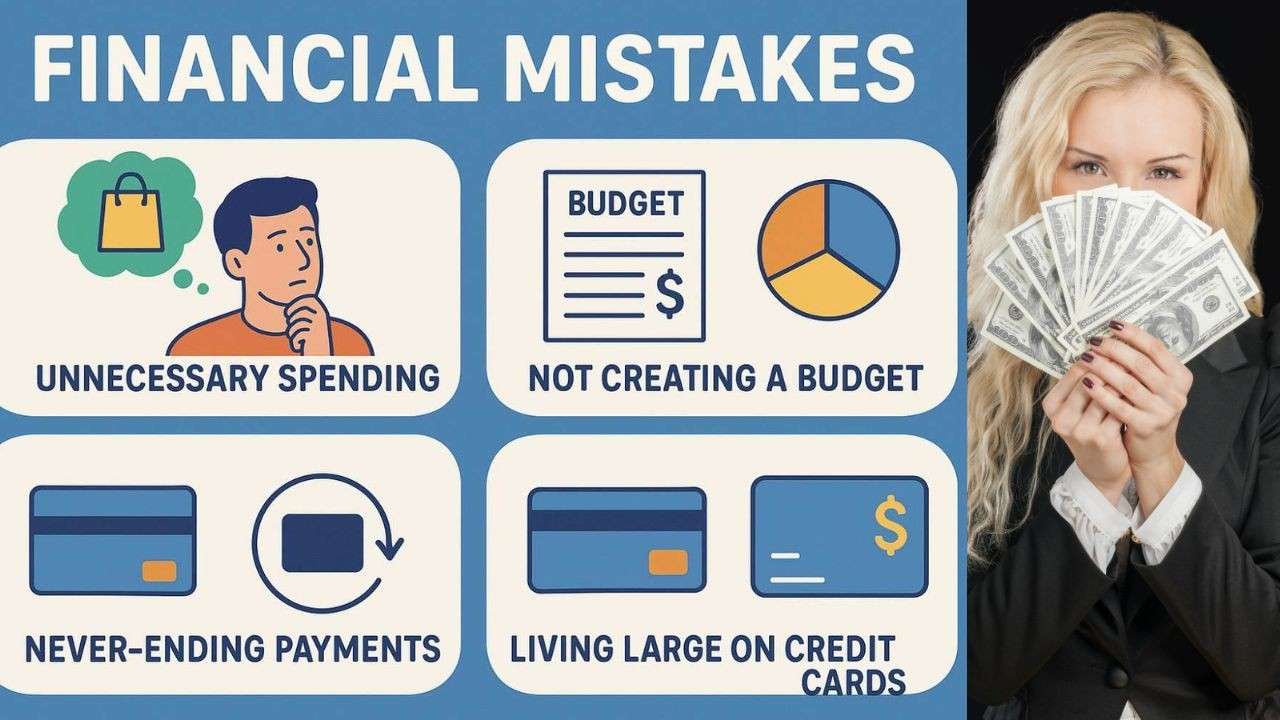Managing money is one of the most valuable life skills, yet many people find it challenging. No matter if you are at the beginning of your career or preparing for retirement, unhealthy financial habits can stand in the way of stability and long-term success. By identifying the most common financial mistakes people make, you can take smarter steps to build a secure and confident future.
1. Unnecessary Spending
Unnecessary expenses are one of the most common mistakes when it comes to a person’s finances. This happens when someone spends money on items or services that are not actually necessary, such as frequent dining, excessive shopping, or buying something extravagant without prior planning. Even if it doesn’t seem like that large of a sum on a singular occasion, it will easily compound and limit your ability to save for the future. Differentiating between what is a “want” and what is a “need” is an important step in recovering from poor financial management and lowering stress around your finances.
This type of spending just needs to be part of your .budget If you plan for it, and you can afford it, then enjoy it.
2. Not Creating a Budget
One of the most common financial mistakes is living without a budget. Many people tend to estimate expenses, which typically results in excessive spending. Without a clear budget, it becomes nearly impossible to account for spending or savings toward meaningful goals.
How to avoid it:
-
Utilizing readily available budgeting apps or simple spreadsheets and maintaining categories of income and expenses are very helpful.
-
Set aside set amounts for necessities, savings, and other pleasure or discretionary spending.
-
You will need to review your budget monthly and update your categories accordingly.
-
A proper budget can allow you to not just avoid overspending but to put you in charge of your financial future.
3. Never-Ending Payments
Before signing up for recurring expenses, ask yourself whether you truly need them. Subscriptions such as streaming services or costly gym memberships often fall into the “want” category rather than actual needs. Choosing more affordable alternatives, like a budget-friendly gym, can still meet your requirements while allowing you to save the extra money for more important goals.

Money Mistakes to Avoid in Life
Managing your finances wisely is essential for achieving long-term security and peace of mind. Unfortunately, many people fall into common financial mistakes without even realizing it, which can seriously impact their financial future. Some of the most critical money mistakes to avoid include unnecessary spending, neglecting savings, taking on excessive debt, and failing to plan for emergencies. By understanding and avoiding these common financial mistakes, you can build a strong financial foundation and take meaningful steps toward reaching your financial goals.
4. Living Large on Credit Cards
Using credit cards to buy non-essential items is a common habit. While some people may be able to handle high-interest rates on luxury clothing or other expensive purchases, it’s not always a smart choice—unless you can pay off the full balance before the month ends. Credit card interest can significantly increase the actual cost of these items. In many cases, relying on credit for non-essentials can even lead to spending more than you earn, putting your financial health at risk.
How Credit Cards Create the Illusion of Wealth
-
The High-Stakes Game of Funding Your Lifestyle with Debt
-
Navigating the Temptation to Spend Beyond Your Means
Choosing the best one depends on your tone:
-
For a bold, modern headline, “Charging the High Life” is excellent.
-
For a serious, warning-piece, “The True Cost of a Credit-Funded Lifestyle” is very strong.
Common Money Mistakes Young Adults Make
This description highlights the common financial mistakes that can derail a young adult’s long-term economic stability, often resulting from a lack of experience or proper planning.
Main Points:
-
Living Beyond Their Means: Spending more than they earn, typically with the aid of credit cards and ‘buy now, pay later’ programs. They become trapped in a cycle of excessive debt and spiraling payments.
-
Neglecting a Budget: By going without a budget, the individual loses track of where their money goes and no ability to save or strategize.
-
No High Interest Debt: People try to save a little money while carrying large balances on their credit cards. It is a net loss to save, while paying interest on debt greater than the interest earned from savings.
-
Not Having an Emergency Fund: Without a safety net (usually 3-6 months of expenses), emergency costs (like a car repair or medical bill) add up quickly and they are forced into debt.
5. Not Investing in Retirement
One of the biggest common financial mistakes people make is neglecting to invest in their retirement early.
If you don’t make your money work for you through investments or other income-generating opportunities, you may never be able to stop working. Relying solely on earned income limits your financial freedom and can make long-term financial goals, like early retirement, much harder to achieve.
Not Saving for Emergencies
One of the most significant common financial mistakes people make is not saving for a rainy day. Life is unpredictable—medical emergencies, car repairs, or an unexpected job loss can happen at any time. Without an emergency fund, it is likely you will have to rely on high-interest loans or credit cards, making your financial burden even worse. By saving a percentage of your income on a consistent basis, you can create a dependable safety net that provides you peace of mind, long-term stability, and prevents you from falling into this common financial mistake.
In this Zero-Based Budgeting Guide, we will explore these two powerful budgeting methods, their advantages, and how you can use them together to support yourself in achieving financial stability
6. Not Saving
One of the most common financial mistakes is an easy one: Fail to save regularly. If you do not save regularly, you can find that you cannot cover future expenses, cannot meet your financial goals, or a cushion for emergency.
Almost everybody spends every dollar they earn, leaving no room for retirement, investments, or unexpected expenses. Even if you save a small portion of income each month, over time it will build up to create financial security, giving you peace of mind and a true foundation on which to establish your financial future.
7. Spending Too Much on Your Home
When purchasing a house, bigger is not necessarily better, especially if you do not have a large family. A 6,000-square-foot home will translate to higher taxes, more maintenance and higher utility bills. Before committing to a home purchase, think about the carrying and operating costs besides the monthly mortgage. You will want to consider if you want to significantly reduce your monthly budget, long-term.
8. Home Equity Mistakes
Leveraging the equity in your home can be a strong financial strategy; btu it may also result in one of the most common financial mistakes that could jeopardize your primary asset if done incorrectly. This outline describes the significant mistakes homeowners shouldn’t make.
Key Home Equity Mistakes to Avoid:
-
Treating Home Equity Like a Piggy Bank: It is a financial blunder to use home equity to buy things for fun or for depreciating assets. This is wasting an asset that should be used to benefit or build up the value of your home, such as upgrades, or for consolidating debt.
-
Underestimating the Total Costs: A good financial blunder is to consider only the loan amount when planning the cost of your loan. Many, if not all, loans come with closing costs and origination fees that may add up to thousands to the cost of the loan, and you should not ignore any potential penalties for early payoff of your loan.
-
Over-Borrowing (and Over-Leveraged): Taking out the maximum available to you is also a risk financial mistake. This can increase your monthly payments beyond what you can afford, especially if the housing market dips and you find yourself “underwater” (owing more than the home is worth).
-
Picking the Wrong Type of Loan: It is common to pick the type of loan you want (fixed-rate Home Equity Loan vs variable-rate HELOC decked all-out without considering your financial goal). Shaping the Market may subject you to an unexpected payment that is both high and unaffordable.
9. The High Cost of Raiding Your Retirement
Going into your retirement savings to pay off debt you owe now is maybe the most common obvious mistake people make that can appear to be a solution. Yet the long-term cost is often dire and irreparable. Although you want to “solve” your debt problem, Common financial mistakes raiding your 401(k), or your IRA is one of the most expensive mistakes you can make. Here’s a look at what you really pay for this frequent mistake.
10. Paying Off Debt With Retirement Savings
You may be thinking that if your debt is costing 20% and your retirement account is making 5%, Retirement exchange for debt.
This means that you will pocket the difference. But this isn’t so easy.
In conjunction with losing the power of compounding, it’s very difficult to pay back those retirement savings, and there is also the potential for a 10% early withdrawal fee if you’re under age 59 ½. Assuming you have the right mindset, borrowing from your 401(k) might make sense, but even the most disciplined savers have trouble putting money aside to replenish these accounts.
Final Thoughts
Avoiding the Top 10 Most Common Financial Mistakes is the first step toward achieving financial independence.
You can achieve a positive financial outcome by budgeting, living below your means, establishing an emergency fund, paying down debt and planning for retirement.
Also, remember that financial success is not the amount of your earning, but how well you are managing what you have.
Read More : Personal vs Credit Card, How to Create a Budget, Medium, Investment , Income Tax






5 thoughts on “Top 10 Most Common Financial Mistakes People Make and How to Avoid Them”